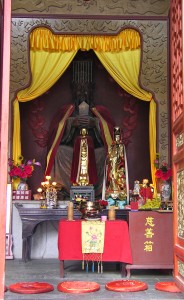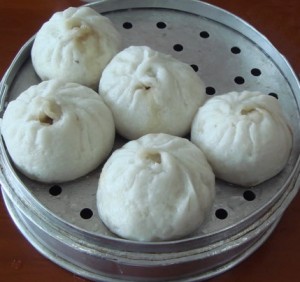President Xi Jinping’s steamed baozi
Last week, Chinese president Xi Jinping caused a sensation after being photographed queueing up for a tray of steamed baozi at a Beijing snack shop, Qing Feng. According to the pics, he bought his own meal ticket, queued up with a tray, collected his pork buns, and then sat down among other customers to eat them. Chinese people have been amazed to hear of their paramount leader rubbing shoulders with the ‘Old Hundred Names’ commoners of Beijing. Some have reacted cynically, wondering if this could possibly be a cynical PR stunt (dreamed up perhaps after former US ambassador to China Gary Locke caused such a stir by buying his own coffee in Beijing), rather than a real glimpse into the hitherto unknown everyday life of Xi Jinping.
It is unusual for today’s Chinese leaders to fraternise with the public. On my most recent trip to China, one of my friends remarked on how leaders’ lives were an absolute mystery: ‘No one ever sees them. We don’t even know if they actually live in Zhongnanhai, the leadership compound, as they are said to. After all, no one ever sees them going in or out.’
 However, it has been a familiar trope for Communist Party dignitaries to drop on on famous Chinese restaurants. If you visit Huogongdian (the Fire Temple) in the centre of the Hunanese capital, Changsha, you can actually see the armchair in which Mao Zedong sat when he visited in April 1958, which has been preserved as an exhibit, cordoned off at the side of one of the private dining rooms. At Lao Sun’s yang rou pao mo (soaked flatbreads with mutton) restaurant in Xian, they have preserved the entire collection of dishes and implements used by various visiting politicians, including Mr Xi’s predecessor Hu Jintao, and put them on display in glass cabinets like holy relics. Many other restaurants I have visited, all over China, proudly display photographs of visiting politicians and generals, or calligraphic inscriptions in which they praise the food.
However, it has been a familiar trope for Communist Party dignitaries to drop on on famous Chinese restaurants. If you visit Huogongdian (the Fire Temple) in the centre of the Hunanese capital, Changsha, you can actually see the armchair in which Mao Zedong sat when he visited in April 1958, which has been preserved as an exhibit, cordoned off at the side of one of the private dining rooms. At Lao Sun’s yang rou pao mo (soaked flatbreads with mutton) restaurant in Xian, they have preserved the entire collection of dishes and implements used by various visiting politicians, including Mr Xi’s predecessor Hu Jintao, and put them on display in glass cabinets like holy relics. Many other restaurants I have visited, all over China, proudly display photographs of visiting politicians and generals, or calligraphic inscriptions in which they praise the food.
And although it might look as though Mr Xi was following the American example in being caught acting normally, his visit to Qing Feng also echoed an old Chinese tradition of emperors venturing out of their palaces to experience the life of the common people. There are countless stories, whether legendary or based in fact, of emperors sneaking out in disguise to eat and drink with their citizens. One of the best known is said to be the origin of that Cantonese habit of tapping fingers on the dim sum table in thanks when someone fills your cup with tea: the Qianlong Emperor, so the tale goes, visited a teahouse incognito, and when he poured tea for his servants they knew the usual kowtows demanded of them by palace etiquette would blow his cover, so they tapped their fingers on the table in a miniature form of prostration.
Such stories are an age-old means of demonstrating the concern of Chinese leaders for their subjects. Of course, when the Qing emperors mingled with the populace (if they actually did), there were no smartphones to record the occasion, or microblogging sites to spread the word. But courtiers with a keen eye for the emperor’s image made sure that word spread that this disguised stranger, so solicitous for the lives of the common people, was in fact the Son of Heaven himself…


Leave a Reply